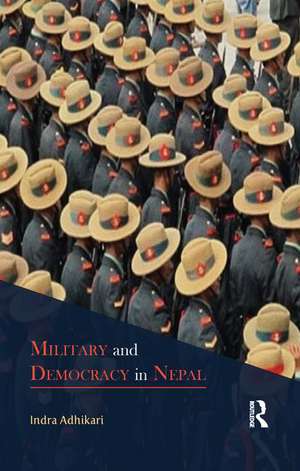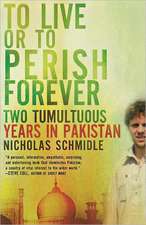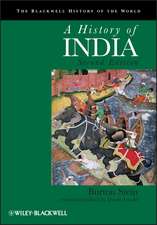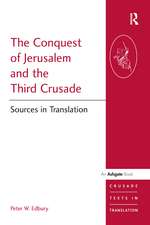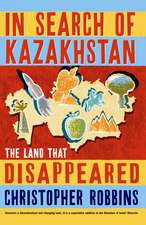Military and Democracy in Nepal
Autor Indra Adhikarien Limba Engleză Paperback – 29 noi 2017
| Toate formatele și edițiile | Preț | Express |
|---|---|---|
| Paperback (1) | 449.41 lei 6-8 săpt. | |
| Taylor & Francis – 29 noi 2017 | 449.41 lei 6-8 săpt. | |
| Hardback (1) | 1166.80 lei 6-8 săpt. | |
| Taylor & Francis – 4 feb 2015 | 1166.80 lei 6-8 săpt. |
Preț: 449.41 lei
Nou
Puncte Express: 674
Preț estimativ în valută:
86.02€ • 93.47$ • 72.31£
86.02€ • 93.47$ • 72.31£
Carte tipărită la comandă
Livrare economică 21 aprilie-05 mai
Preluare comenzi: 021 569.72.76
Specificații
ISBN-13: 9780815373117
ISBN-10: 0815373112
Pagini: 384
Dimensiuni: 138 x 216 x 20 mm
Greutate: 0.45 kg
Ediția:1
Editura: Taylor & Francis
Colecția Routledge India
Locul publicării:Oxford, United Kingdom
ISBN-10: 0815373112
Pagini: 384
Dimensiuni: 138 x 216 x 20 mm
Greutate: 0.45 kg
Ediția:1
Editura: Taylor & Francis
Colecția Routledge India
Locul publicării:Oxford, United Kingdom
Public țintă
PostgraduateCuprins
1. Introduction 2. Civil–Military Relations and Democratization 3. Military Recruitment, Development and Trends 4. Military–democracy Interface (1990–2002) 5. The King vs Democracy (2002–2006) 6. The Power Shift 2006: Restoration of Democracy and the Democratization of the Military 7. Conclusion
Recenzii
Based on research and in-depth study of origin, development and nature of [the] Nepalese army and its role . . . in democratic evolution as well as in its retardation, this work would definitely provide a new perspective on the triangular relationship between monarchy, army and democracy.
— Lok Raj Baral, Professor and Executive Chairman, Nepal Centre for Contemporary Studies (NCCS); and former Ambassador of Nepal to India
A perceptive, incisive and thorough analysis of the relationship between army, monarchy and elected government, constituting the triumvirate of Nepalese politics. A must-read for a deeper understanding of the evolution of this politics over the last quarter century.
— Muchkund Dubey, President, Council for Social Development; and former Foreign Secretary, Government of India
...Adhikari’s piece is much richer than previous literature in terms of information and analytical balance. She has adequate evidence in the book to establish her arguments. It will prove useful for academic audiences as much as for those who seek in-depth knowledge about the organizational biography of the Nepalese Army. The introductory part consists of a good conceptual discourse and empirical evidence. The details on the evolution, institutional structures, recruitment trends, and orientation of the Nepalese Army are thought provoking. This section also broadens the reader’s insight because the author contextualizes the Nepalese case with other South Asian countries. The research process has covered a wide variety of informants, which reflects the author’s diligence.
—Safal Ghimire, University of New England, Armidale, Australia, Pacific Affairs
— Lok Raj Baral, Professor and Executive Chairman, Nepal Centre for Contemporary Studies (NCCS); and former Ambassador of Nepal to India
A perceptive, incisive and thorough analysis of the relationship between army, monarchy and elected government, constituting the triumvirate of Nepalese politics. A must-read for a deeper understanding of the evolution of this politics over the last quarter century.
— Muchkund Dubey, President, Council for Social Development; and former Foreign Secretary, Government of India
...Adhikari’s piece is much richer than previous literature in terms of information and analytical balance. She has adequate evidence in the book to establish her arguments. It will prove useful for academic audiences as much as for those who seek in-depth knowledge about the organizational biography of the Nepalese Army. The introductory part consists of a good conceptual discourse and empirical evidence. The details on the evolution, institutional structures, recruitment trends, and orientation of the Nepalese Army are thought provoking. This section also broadens the reader’s insight because the author contextualizes the Nepalese case with other South Asian countries. The research process has covered a wide variety of informants, which reflects the author’s diligence.
—Safal Ghimire, University of New England, Armidale, Australia, Pacific Affairs
Descriere
This book focuses on the response of the military in Nepali polity which tried to practice a multi-party system along with the concept of the 'king in Parliament' after the restoration of democracy. It discusses the democratic struggle in Nepal, and the response of the military to such struggle.
